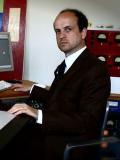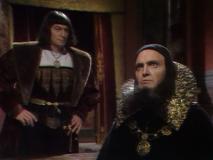The New Radiophonic Workshop
Wednesday, 12 September 2012 - Reported by Chuck Foster
A new composition has been unveiled today to commemorate the BBC's historic Bush House, which ceased broadcasting in July. It was composed by Matthew Herbert, who has been appointed the creative director of the New Radiophonic Workshop, the successor to the original BBC Radiophonic Workshop that itself closed some fourteen years ago.
The piece was commissioned as the former World Service headquarters sees much of its old equipment being sold off in auction over the coming week; talking about the closure and its relevance to the Radiophonic Workshop, Herbert said:
 The New Radiophonic Workshop was formed this year as part of an initiative undertaken by THE SPACE, an experimental digital Arts portal managed by Arts Council England and developed in partnership with the BBC. The workshop's first commission was The Sound of The Space, a compilation that brings together some twenty-five themes from across the portal, and can be listened to via their website.
The New Radiophonic Workshop was formed this year as part of an initiative undertaken by THE SPACE, an experimental digital Arts portal managed by Arts Council England and developed in partnership with the BBC. The workshop's first commission was The Sound of The Space, a compilation that brings together some twenty-five themes from across the portal, and can be listened to via their website.
An accomplished musician and contributor to fellow artists' projects and films, Matthew Herbert has also been credited with pioneering the use of 'found' sound in modern electronic music, that is, the integration of naturally occurring sound within compositions.
Joining him in the new Workshop initiative are music/sound designer Yann Seznec, composer Max de Wardener, broadcast technologist Tony Churnside, musician Mica Levi, theatre director Lyndsey Turner, and creative technologist Patrick Bergel.
Unlike the original workshop, which was based in Maida Vale, the new one is described as "a virtual institution, an online portal and forum for discussion around the challenges of creating new sounds, and bringing together music composition and software design."
Speaking of the resurrection of a pioneering institution, Herbert said:
BBC Radiophonic Workshop
The inspiration of "radiophonic" aware BBC producers such as Desmond Briscoe and Daphne Oram, the BBC's Radiophonic Workshop was founded in 1958, headed by Briscoe with technical assistant Dick Mills. The Workshop was at the cutting edge of electronic sound and music development, and attracted the talents of composers including Delia Derbyshire (who realised the original Doctor Who theme tune) and Brian Hodgson (who created many of the special sounds heard in the early years of the show).
THE SPACE have provided a short video interview with the Radiophonic Workshop team, which originates from a Tomorrow's World from 1965.
The piece was commissioned as the former World Service headquarters sees much of its old equipment being sold off in auction over the coming week; talking about the closure and its relevance to the Radiophonic Workshop, Herbert said:
The closure of Bush House draws a line under what one aspect of the BBC used to be about - warrens of small rooms and big lumps of equipment hidden from the public. New Broadcasting House is the opposite - open and visible, with technology taking up a much smaller footprint.
In its original incarnation, the Radiophonic Workshop was certainly highly representative of this first description. In its new location, as part of the virtual resource of thespace.org, the current iteration of the Radiophonic Workshop is seeking to acknowledge and document this shift in broadcasting from an impervious, imperious presence to a more democratic, fluid and open system.
In this context, this piece of music for Bush House is a small footnote, an audio reminder of how far we have come in the last 100 years of listening.
The piece can be listened to via the right button, or on THE SPACE website.In its original incarnation, the Radiophonic Workshop was certainly highly representative of this first description. In its new location, as part of the virtual resource of thespace.org, the current iteration of the Radiophonic Workshop is seeking to acknowledge and document this shift in broadcasting from an impervious, imperious presence to a more democratic, fluid and open system.
In this context, this piece of music for Bush House is a small footnote, an audio reminder of how far we have come in the last 100 years of listening.
 The New Radiophonic Workshop was formed this year as part of an initiative undertaken by THE SPACE, an experimental digital Arts portal managed by Arts Council England and developed in partnership with the BBC. The workshop's first commission was The Sound of The Space, a compilation that brings together some twenty-five themes from across the portal, and can be listened to via their website.
The New Radiophonic Workshop was formed this year as part of an initiative undertaken by THE SPACE, an experimental digital Arts portal managed by Arts Council England and developed in partnership with the BBC. The workshop's first commission was The Sound of The Space, a compilation that brings together some twenty-five themes from across the portal, and can be listened to via their website.An accomplished musician and contributor to fellow artists' projects and films, Matthew Herbert has also been credited with pioneering the use of 'found' sound in modern electronic music, that is, the integration of naturally occurring sound within compositions.
Joining him in the new Workshop initiative are music/sound designer Yann Seznec, composer Max de Wardener, broadcast technologist Tony Churnside, musician Mica Levi, theatre director Lyndsey Turner, and creative technologist Patrick Bergel.
Unlike the original workshop, which was based in Maida Vale, the new one is described as "a virtual institution, an online portal and forum for discussion around the challenges of creating new sounds, and bringing together music composition and software design."
Speaking of the resurrection of a pioneering institution, Herbert said:
It is the perfect time for the rebirth of the workshop. The rapid pace of change in technologies has meant our imaginations are struggling to keep up.
By bringing together the people making the technology with people making the music, we are hoping to find engaging answers to some of the modern problems associated with the role of sound and music on the internet, in certain creative forms and within broadcasting."
By bringing together the people making the technology with people making the music, we are hoping to find engaging answers to some of the modern problems associated with the role of sound and music on the internet, in certain creative forms and within broadcasting."
BBC Radiophonic Workshop
The inspiration of "radiophonic" aware BBC producers such as Desmond Briscoe and Daphne Oram, the BBC's Radiophonic Workshop was founded in 1958, headed by Briscoe with technical assistant Dick Mills. The Workshop was at the cutting edge of electronic sound and music development, and attracted the talents of composers including Delia Derbyshire (who realised the original Doctor Who theme tune) and Brian Hodgson (who created many of the special sounds heard in the early years of the show).THE SPACE have provided a short video interview with the Radiophonic Workshop team, which originates from a Tomorrow's World from 1965.


















